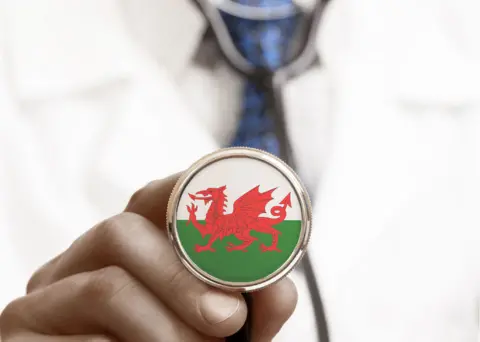Warning over NHS Wales Brexit 'catastrophe'
 Niyazz/Getty Images
Niyazz/Getty ImagesAny Brexit which means leaving the single market could be catastrophic for the NHS and particularly devastating in Wales, a health academic has warned.
Nick Fahy, a health policy senior researcher at the University of Oxford said a hard or no deal Brexit could leave patients "at immediate risk".
He also warned if EU staff left the UK, London could "suck in" Welsh NHS staff.
The Welsh Conservatives said a key aim in talks was to ensure healthcare delivery "remains seamless".
Mr Fahy outlined issues ranging from potential risks to the NHS budget, workforce shortages and uncertainty over future arrangements for research and medicines.
"It's going to be very hard, I don't think we should be under any illusions about that - and that's why what kind of Brexit we have really matters," he said.
He is the co-author of a report in The Lancet which looks at potential consequences for the NHS from different Brexit scenarios.
"If we have a soft Brexit - where we remain pretty well integrated within the single market, where we continue to have an ability for EU doctors and nurses to come and work here and feel confident about their future in the country, then I think the impact can be managed and be relatively minor," he said.
"If we have a hard or no deal Brexit, I think the impact risks being catastrophic."
He said it posed a "substantial and real threat to healthcare".
"We haven't got slack in the NHS; we're not coming at this from a position of strength, but from a position where each winter we breathe a sigh of relief that we managed to make it through without the NHS collapsing and that doesn't give us a situation of reserves we can draw on."
Mr Fahy is a specialist adviser to the Commons health committee and has worked for both the Department of Health and European Commission.
He said the UK has an "unusually high dependency" on workers from abroad.
Although the picture is different in Wales - only 2% of the NHS workforce is from the EU - it could be vulnerable to workers moving elsewhere if EU workers left the south east and London.
Mr Fahy said hospitals in London would have to offer more money and the risk is that in the medium term, this will "suck in" health professionals from Wales.
Carol Shillabeer, chief executive of Powys health board, said there were already significant recruitment issues and it could be a particular problem for the social care sector, which was "hugely reliant" on EU workers.
"If we reel forward, what could happen without that workforce, we start to think about sustainability of the social care sector, particularly residential homes, the availability of surgeons; you start to see the workforce eroded even further."
Welsh Conservative leader Andrew RT Davies said: "Key among the aims in our negotiations with EU partners is to ensure that the delivery of healthcare remains seamless, and that the rights of UK and EU nationals can be guaranteed.
"Further to this, it is vitally important that the pharmaceutical industry maintains the confidence to continue investing in Wales, and that the regulatory environment is conducive to patients across the UK's four constituent nations having access to the latest medicines.
"Of course, when we end our relationship with the EU, additional monetary resources will become available for future governments to invest in our hard-pressed NHS services."
The Welsh Government paid tribute to NHS workers from the EU and said Brexit posed a number of challenges.
"We want EU nationals currently working in the NHS in Wales, or those who wish to come here to work, to feel welcome," said a spokesperson.
"Despite record numbers of frontline NHS staff working in Wales, some professions and speciality fields still face recruitment challenges. Health boards, along with our support, are working to address these challenges."
